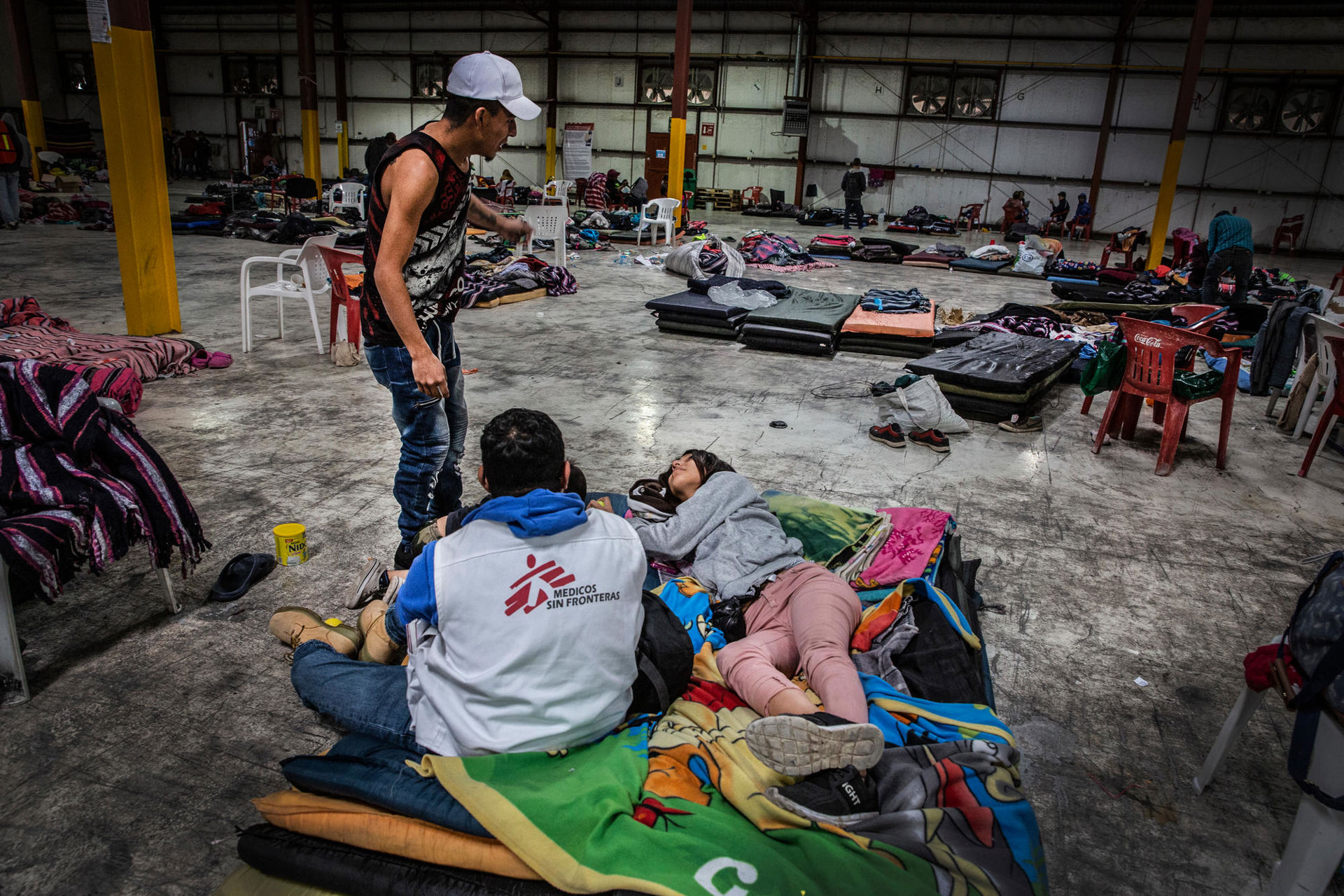Felipe Reyes is a psychologist with Médecins Sans Frontières/Doctors Without Borders (MSF) in Mexico. He provides psychological first aid (PFA) through a psychological helpline to migrants and asylum seekers. Reyes tells the story of one of his patients, whose experiences illustrate the lack of protection and lack of access to medical services that thousands of people can face while waiting at the Mexico-United States border, one of the most dangerous places for them.

A migrant talks to an MSF psychologist at the Piedras Negras Sports Pavilion. MSF’s work with migrants in Mexico is based fundamentally on psychological help. © Juan Carlos Tomasi
Karina* is an asylum seeker currently living in Mexico with her family. She had to leave Honduras several months ago with her partner and their four and nine-year-old daughters. She had been threatened by her former partner, who is part of a gang. After they broke up, he threatened to kill her, her daughters and her current partner. She had no choice but to flee the country. She managed to reach the northern border of Mexico to request asylum in the United States.
As part of the United States Migrant Protection Programme (MPP), Karina was returned to Mexico to await her asylum hearing in front of an immigration judge in the United States. For now, she waits in Monterrey, with her family, for her next court date.
While waiting in Monterrey, Karina learned that she was pregnant. She did not suspect it when she left on her trip to Mexico, but found out about it when she got there. She thought that if the baby was born in the United States, it would be easier for them to fight for asylum or, failing that, to request naturalization for herself and her family. While in Monterrey, Karina realised that it would not be a safe place for her or her family.
As the day of her first hearing approached, Karina and her family took a van from Monterrey to the international bridge in Nuevo Laredo, one of the most dangerous cities for migrants, where they are frequently assaulted. The bridge is the official route to cross into the United States. But, as soon as they entered Nuevo Laredo they were stopped by a pick-up truck full of armed men. The men ordered the driver to park at the side of the road and open the vehicle doors. The armed men took two people who, like Karina, were going to appear at an asylum hearing in the United States.
Karina was terrified; she thought they would take her daughters as well. After this happened, she began to feel a sharp pains in her belly, dizziness and a lot of nausea. She told me later that, when she arrived at the Mexican immigration office, she asked for medical attention and was denied.
Once in the United States, she thought she would be able to receive medical help, but she says that she was also told no there as well. After spending the day in intense pain, she began to bleed profusely and it was then that they agreed to provide her with care.
Unfortunately, it was too late and Karina had lost her baby. They returned her to her cell where she waited for her hearing. Later on, she returned to Mexico with her family to await the judge's response. She does not yet know if she will be granted asylum, if she will have to stay in Mexico or if she will be returned to Honduras. The idea that she might have to return terrifies her so much that she suffers from panic attacks. There is not a day when she does not think about the baby that she will not hold in her arms and about protecting her child that are still alive.
The violence that she has suffered in her life has left Karina with recurring nightmares, where she relives the things she has experienced. She feels a constant fear, especially when she leaves the house alone. She is on alert all the time and, as a result, has a hard time trusting people, including herself. Some days she notices that she is more irritable. There are days when she has a hard time finding reasons to go on living. She clings to the love she feels for her daughters, her main reason for carrying on.
I have worked for more than a year with MSF as a psychologist helping migrants and refugees through a dedicated counselling helpline. We are supporting migrants and refugees who travel along the migratory route that crosses Mexico. This is how I met Karina. The law firm in the United States that is handling her case told her about our service.
I have learned that when the phone rings, there is a person at the other end of the line who really needs me. Sometimes because their life is at risk. Others feel lost and alone or they have been assaulted, perhaps sexually, or kidnapped. It may be someone who, after a life of struggle, is thinking of taking their own life because they can no longer bear any more suffering.
The migrant’s journey is full of unforeseen events and adversities. This is why we are always looking for ways to bring our services closer to them; medical care, social work and especially mental health care, one of the great missing parts of the health services in Mexico. This is why we seek to help them through the direct consultations we offer along the migration route and also by telephone if they are on the move or can’t reach us. Every day I receive calls from patients that shock me because of the strength and resilience that these people show. Karina has been one of them.
*The patient's name has been changed to protect her identity.

